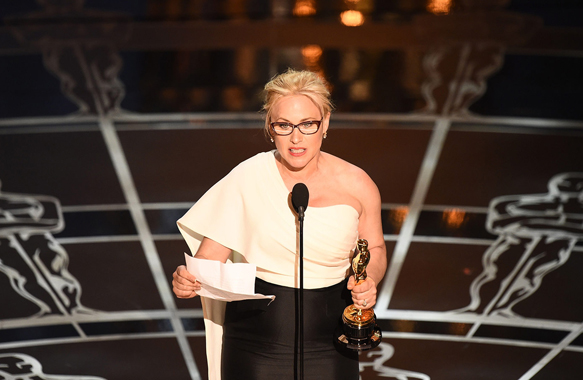By Tiffanie Drayton | Originally Published at The Frisky. February 24, 2015
Patricia Arquette’s Oscar acceptance speech imploring for wage equality was met with applause by her peers, including Meryl Streep. However, as The Frisky told you yesterday, her backstage interview — which was reasonably referred to as “tone deaf” where racial politics are concerned — attracted negative attention and response. To recap, this is what she said:
In truth, America does have a wage gap problem that needs to be explored. And that problem can, indeed, be labeled a “gender-based” problem. However, the biggest wage gaps are interracial and not necessarily gender-specific. In order to truly delve into the issue, here are some highlights from the U.S. Bureau Labor of Statistics 2013/2014 December Report:
- Asian men out earned all other demographics, with a weekly median earning of $1,059. In comparison, White men earned $884, Black men $664 and Hispanic or Latino men earned $594.
- Asian women and White women (with weekly median earnings of $819 and $722 respectively) earned more than Black men and Hispanic men.
- Black women and Hispanic women had the lowest median incomes earning $606 and $541, respectively.
While it is true that, as a whole, women still struggle to earn as much as their male counterparts, the largest income gaps are race specific. Only when we compare male-to-female differences in income among individuals of the same race does a gender-specific gap even become worthy of talking about. After all, I would much rather be a White woman and have a weekly earning of $722, than be a Hispanic man who earns $594 in that same time period.
In fact, according to the report, “Earnings growth has been greatest for White women, outpacing that of their Black and Hispanic counterparts. Between 1979 and 2013, inflation-adjusted earnings (also called constant-dollar earnings) rose by 31 percent for White women, compared with an increase of 20 percent for Black women and 15 percent for Hispanic women.”
So while the gap between White women and their male counterparts — who both far out earn Black and Hispanic men, not to mention Black and Hispanic women — is steadily closing, minority women are forced to struggle even harder to close the gender gap and the race gap. This is why minority women and their struggles cannot be conveniently absorbed into a gendered conflict by White feminism.
To clarify her comments, Patricia Arquette tweeted:
Earnings differences between women and men were the most pronounced for Asians and for Whites. Asian women earned 77 percent as much as Asian men in 2013, and White women earned 82 percent as much as their male counterparts. In comparison, Black and Hispanic women had median earnings that were 91 percent of those of their male counterparts.
This highlights the problem with White feminism and the platform it has created for White women to fight battles against their White male counterparts and White patriarchy: it fails to account for the realities faced by women of color. Arquette’s call for solidarity from men of color and women of color, who are actually far more oppressed than she or any woman of her demographic, is not only short-sighted but incredibly marginalizing and deeply problematic. If Arquette and White feminists like her want to inspire WOC to rally on behalf of “ALL women” in the fight for equal pay, they’d better be willing to rally just as hard to close the race-based gap that takes the biggest toll on women of color.
Tiffanie Drayton is a freelance writer and graduate of The New School University. She hopes to one day return to an equal and racially tolerant America.
This piece was reprinted by EmpathyEducates with the kind permission of the Author, Tiffanie Drayton. We thank Tiffanie for her open voice and honest sharing, and for reminding all of us what it means to be truly caring.












Leave A Comment